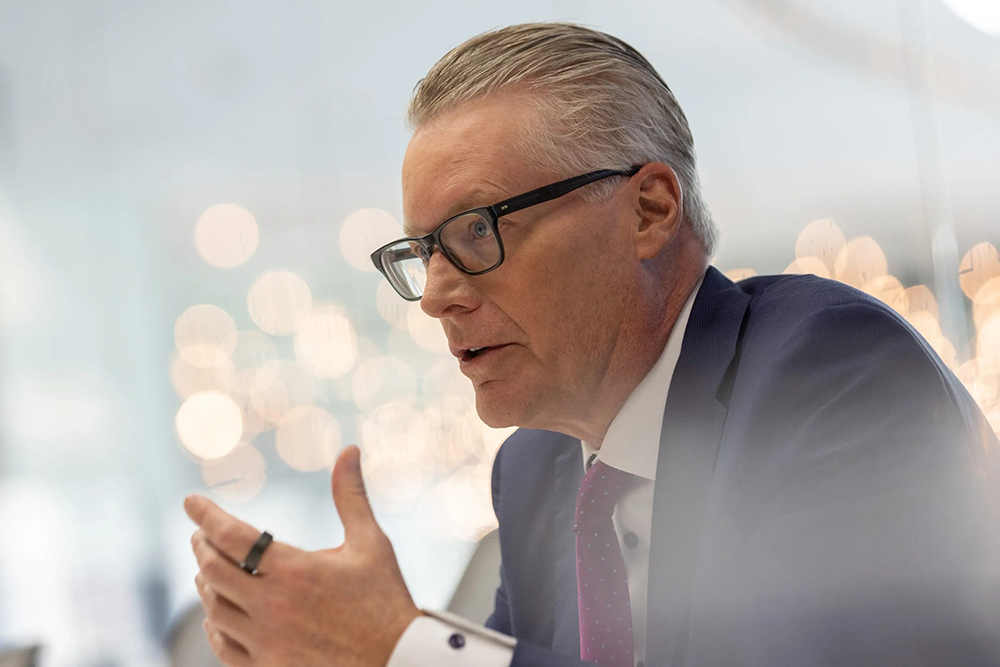
25歲那年,現任達美航空公司(Delta Air Lines)CEO埃德·巴斯蒂安才第一次坐上飛機。在多年以后的今天,他已成為《財富》世界500強企業中最受人愛戴的CEO之一。
巴斯蒂安在達美航空工作已經超過25年時間,可謂見多識廣。無論是9·11事件對航空業的重創,還是2005年多家航空公司宣告破產,數千名員工遭到裁員,又或是后來讓航空業工作崗位減少約43%的新冠疫情,他都有親身經歷。
但達美航空不僅成功走出了困境,還逐漸成為全球最賺錢的航空公司。作為《財富》全球最受贊賞公司,達美航空之所以能取得如此成功,巴斯蒂安功不可沒。他還被《首席執行官》(Chief Executive)雜志評為2023年度最佳CEO。
在“西南偏南”(South by Southwest)年度系列科技、音樂和電影盛會上,巴斯蒂安登臺亮相,與《財富》雜志主編尚艾儷進行了一場精彩對話,講述了自己帶領公司走向成功的秘訣。
1.以人為本
2005年,隨著西北航空(Northwest Airlines)、全美航空( US Airways)和美聯航(United Airlines)等大型航空公司紛紛申請破產,達美航空也未能幸免,同樣走上了破產之路。
破產后,公司采取了降薪措施,并裁撤了至少7000名員工,但也建立起了“以員工為中心”的全新企業文化,這首先體現在發放管理層薪酬前優先發放員工工資上。巴斯蒂安說,現在,員工工資占“公司利潤的15%,并且先于管理層發放”。
達美航空于2007年推出利潤分成模式,在公司資金緊張時為員工提供財務緩沖。該項福利在2020年曾短暫收回,恢復后一直延續至今。今年,達美航空在該模式下以獎金支票的形式向員工發放了14億美元,相當于員工年薪的10%以上。
但“我們做的最重要的一件事是,”巴斯蒂安告訴《財富》雜志,“我們開始把員工聚在一起,200到300人一組,舉行所謂的‘天鵝絨’會議,這種會議在20多年后的今天仍在繼續舉行。”
在‘天鵝絨’會議上,員工們可以就公司業務以及自己在其中的角色展開討論,還可以共同謀劃公司愿景。他說:“這樣做上20年,員工自然能感受到企業文化的溫度。”
2.直面挑戰,勇于創新
9·11襲擊和新冠疫情等全球性事件幾乎在一夜之間就徹底改變了航空業。
2001年襲擊事件發生時,巴斯蒂安正在達美航空亞特蘭大辦事處工作,他在接受《紐約時報》采訪時說,“國際航空業務幾乎在一夜之間歸零”。
隨后幾年,達美航空采取了一系列非常規商業舉措,包括在2012年為抵消航空燃油價格上漲帶來的風險收購了一家煉油廠。當時,該公司宣布將斥資1.5億美元收購位于費城附近的一家煉油廠,并計劃再投入1億美元對工廠進行翻新,從而提高航油收益。
然后又爆發了那場對出行行業造成毀滅性打擊的新冠疫情。根據一項分析新冠疫情對航空運輸業影響的研究,2020年,航空業的凈損失超過1260億美元,航空旅客人數減少了60%,直接為航空業服務的工作崗位減少了43%。
達美航空通過取消改簽費吸引了旅客回流,這種做法也幫助其與旅客建立起了信任關系,讓旅客愿意在準備再次出行時選擇自己的服務。他們還利用這段停工時間招聘、培訓了一支強有力的員工隊伍。
3. 犧牲小我,成就大我
為應對2020年爆發的新冠疫情,巴斯蒂安決定放棄自己當年一半的薪水,總額接近94.6萬美元。與此同時,新冠疫情也給他個人造成了沖擊。2020年2月底,撫養巴斯蒂安和他八個兄弟姐妹長大的母親因新冠肺炎逝世。他說,失去“自己的英雄”讓他“痛不欲生”。
不過,他說,在那種時刻,“他不能為因自己或他人的不幸而深陷痛苦無法自拔,而是要承擔起領導的責任。”
疫情期間,達美航空也出現了人員流失情況,流失員工約占員工總數的四分之一,但巴斯蒂安說,“在整個疫情期間,公司未解雇任何一名員工。”
他說:“我們有50000名員工休了最長兩年的無薪假,”又補充道,但福利和差旅權益沒有變化。此舉使“公司規模在一夜之間縮減一半”,后來又有2萬名員工同意提前退休。疫情結束后,達美航空立刻把員工招了回來。
或許達美航空CEO喜歡用另一種方式節約成本?只要是在美國國內出差,他都會乘坐經濟艙,還親自出鏡錄制了該公司的飛機起飛前安全演示視頻。 (財富中文網)
譯者:梁宇
審校:夏林
2022年11月,達美航空CEO埃德·巴斯蒂安在紐約接受采訪。
25歲那年,現任達美航空公司(Delta Air Lines)CEO埃德·巴斯蒂安才第一次坐上飛機。在多年以后的今天,他已成為《財富》世界500強企業中最受人愛戴的CEO之一。
巴斯蒂安在達美航空工作已經超過25年時間,可謂見多識廣。無論是9·11事件對航空業的重創,還是2005年多家航空公司宣告破產,數千名員工遭到裁員,又或是后來讓航空業工作崗位減少約43%的新冠疫情,他都有親身經歷。
但達美航空不僅成功走出了困境,還逐漸成為全球最賺錢的航空公司。作為《財富》全球最受贊賞公司,達美航空之所以能取得如此成功,巴斯蒂安功不可沒。他還被《首席執行官》(Chief Executive)雜志評為2023年度最佳CEO。
在“西南偏南”(South by Southwest)年度系列科技、音樂和電影盛會上,巴斯蒂安登臺亮相,與《財富》雜志主編尚艾儷進行了一場精彩對話,講述了自己帶領公司走向成功的秘訣。
1.以人為本
2005年,隨著西北航空(Northwest Airlines)、全美航空( US Airways)和美聯航(United Airlines)等大型航空公司紛紛申請破產,達美航空也未能幸免,同樣走上了破產之路。
破產后,公司采取了降薪措施,并裁撤了至少7000名員工,但也建立起了“以員工為中心”的全新企業文化,這首先體現在發放管理層薪酬前優先發放員工工資上。巴斯蒂安說,現在,員工工資占“公司利潤的15%,并且先于管理層發放”。
達美航空于2007年推出利潤分成模式,在公司資金緊張時為員工提供財務緩沖。該項福利在2020年曾短暫收回,恢復后一直延續至今。今年,達美航空在該模式下以獎金支票的形式向員工發放了14億美元,相當于員工年薪的10%以上。
但“我們做的最重要的一件事是,”巴斯蒂安告訴《財富》雜志,“我們開始把員工聚在一起,200到300人一組,舉行所謂的‘天鵝絨’會議,這種會議在20多年后的今天仍在繼續舉行。”
在‘天鵝絨’會議上,員工們可以就公司業務以及自己在其中的角色展開討論,還可以共同謀劃公司愿景。他說:“這樣做上20年,員工自然能感受到企業文化的溫度。”
2.直面挑戰,勇于創新
9·11襲擊和新冠疫情等全球性事件幾乎在一夜之間就徹底改變了航空業。
2001年襲擊事件發生時,巴斯蒂安正在達美航空亞特蘭大辦事處工作,他在接受《紐約時報》采訪時說,“國際航空業務幾乎在一夜之間歸零”。
隨后幾年,達美航空采取了一系列非常規商業舉措,包括在2012年為抵消航空燃油價格上漲帶來的風險收購了一家煉油廠。當時,該公司宣布將斥資1.5億美元收購位于費城附近的一家煉油廠,并計劃再投入1億美元對工廠進行翻新,從而提高航油收益。
然后又爆發了那場對出行行業造成毀滅性打擊的新冠疫情。根據一項分析新冠疫情對航空運輸業影響的研究,2020年,航空業的凈損失超過1260億美元,航空旅客人數減少了60%,直接為航空業服務的工作崗位減少了43%。
達美航空通過取消改簽費吸引了旅客回流,這種做法也幫助其與旅客建立起了信任關系,讓旅客愿意在準備再次出行時選擇自己的服務。他們還利用這段停工時間招聘、培訓了一支強有力的員工隊伍。
3. 犧牲小我,成就大我
為應對2020年爆發的新冠疫情,巴斯蒂安決定放棄自己當年一半的薪水,總額接近94.6萬美元。與此同時,新冠疫情也給他個人造成了沖擊。2020年2月底,撫養巴斯蒂安和他八個兄弟姐妹長大的母親因新冠肺炎逝世。他說,失去“自己的英雄”讓他“痛不欲生”。
不過,他說,在那種時刻,“他不能為因自己或他人的不幸而深陷痛苦無法自拔,而是要承擔起領導的責任。”
疫情期間,達美航空也出現了人員流失情況,流失員工約占員工總數的四分之一,但巴斯蒂安說,“在整個疫情期間,公司未解雇任何一名員工。”
他說:“我們有50000名員工休了最長兩年的無薪假,”又補充道,但福利和差旅權益沒有變化。此舉使“公司規模在一夜之間縮減一半”,后來又有2萬名員工同意提前退休。疫情結束后,達美航空立刻把員工招了回來。
或許達美航空CEO喜歡用另一種方式節約成本?只要是在美國國內出差,他都會乘坐經濟艙,還親自出鏡錄制了該公司的飛機起飛前安全演示視頻。 (財富中文網)
譯者:梁宇
審校:夏林
Delta Air Lines CEO Ed Bastian was 25 when he first got on a plane. Since then, he’s become one of the most admired CEOs on the Fortune 500.
Bastian, who’s been with the company for over 25 years, has seen it all. There was the industry fallout from the 9/11 attacks; a slew of airlines announcing bankruptcy amid thousands of job cuts in 2005; and later the pandemic, which slashed aviation jobs by about 43%.
Yet Delta got through hard times to become the most profitable airline company in the world. It owes much of its success as a Fortune World’s Most Admired Company to Bastian’s leadership. He was also named Chief Executive?magazine‘s CEO of the year in 2023.
Bastian took the stage at South by Southwest’s annual series of tech, music and film conferences, joining Fortune’s editor·in·chief Alyson Shontell to describe how he steered the company to success.
1.People first
In 2005, Delta joined other big airline companies, like Northwest, US Airways, and United Airlines in filing for bankruptcy.
The bankruptcy, which led to at least 7,000 layoffs and pay cuts, also helped kickstart a new era of employee·focused company culture—which starts with employees getting paid before management. Now, Bastian said, employees get “15% of the profits of the company and get paid before management.”
Delta rolled out a profit·sharing model in 2007 and gave employees a financial cushion when company money was tight. It’s a benefit they’ve continued since a brief pause in 2020. This year, Delta gave employees $1.4 billion under the model through a bonus check that amounted to over 10% of their annual salary.
But “the single most important thing we did,” Bastian told Fortune, “is we started to gather our people together in groups of 200 to 300 people at a time in sessions called Velvet, which are ongoing today, over 20 years later.”
In Velvet sessions, employees talk about the business and their roles in it, and they cast company visions together. “If you do that over 20 years,” he said, “that culture is palpable.”
2.Innovate during challenging times
World events, like the 9/11 attacks and the pandemic, drastically changed the airline industry nearly overnight.
At the time of the 2001 attacks, Bastian was working in Delta’s Atlanta office and saw “international business drop to almost nothing overnight,” he said in an interview with the New York Times.
In the following years, Delta made a number of unconventional business moves, including its purchase of an oil refinery to offset risks of higher jet fuel prices in 2012. The company announced it would spend $150 million to acquire the refinery, located near Philadelphia, and an additional $100 million to renovate the plant to increase its jet fuel harvest.
Then came a travel·killing pandemic. The industry reported net losses of over $126 billion in 2020; the number of air passengers reduced by 60%, and direct aviation jobs dropped by 43%, according to a study that analyzed the impacts of the pandemic on air transportation.
Bastian’s team at Delta enticed travelers back by eliminating change fees, which helped build trust with customers when they were ready to travel again. They also used the downtime to hire and train a strong workforce.
3. Put your own ego aside
In response to the 2020 pandemic, Bastian decided to go without half his salary for the year, which would have totaled nearly $946,000. Meanwhile, the pandemic didn’t spare him personally. His mother, who raised Bastian and his eight siblings, passed away from COVID·19 at the end of February 2020. He said he was “distraught” to lose his “personal hero.”
Still, he said, it was a moment that “was not the time to feel sorry for myself or anyone. This is the time to lead.”
The company saw turnover; about a quarter of the company’s workforce naturally turned over during the pandemic, and Bastian said the company “did not lay one person off throughout the entire pandemic.”
“We had 50,000 people take up to two years off without pay,” he said, and added that benefits and travel privileges were intact. The move shrunk the “company in half overnight”; 20,000 more employees agreed to take an early retirement. Once the pandemic cleared, Delta brought people back.
Perhaps another way the Delta CEO likes to save on costs? He flies coach on domestic trips and serves as the face of the airline’s pre·flight safety video.






